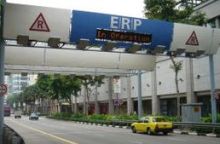Is technology making us lazy?

Last night, I watched the news in utter dismay as Singapore's Land Transport Authority (LTA) announced plans to further increase road tolls and extend the coverage of the country's Electronic Road Pricing (ERP). As expected, the government says its primary objective for doing so is to help relieve congestion and improve traffic flow.
As a car owner, I don't greet such moves with open arms but I've always regarded the ERP system as one of the finest examples of how technology--when applied ingeniously--can help address business challenges. However, is the ERP network encouraging Singapore's transport authority to stop thinking innovatively?
Introduced in 1998, the ERP system uses a culmination of smart card and RFID(radio frequency identification) technology. The entire network comprises gantries located along highways and roads that are frequently congested during peak hours, as well as in-vehicle units (IUs) that are affixed on every vehicle including motorbikes.

Smart cards carrying stored cash value--also dubbed CashCards--are inserted into the IUs, and the funds are deducted each time a vehicle passes under an ERP gantry that's in operation.
It's a great infrastructure because it allows the government to not only easily collect but also manage toll fees, which vary according to specific hours of the day. It also reduces administrative costs because the onus is on drivers to remember to insert their CashCards into the IU--errant drivers face a penalty if they fail to do so.
In fact, the ERP system has been such a success that the LTA often looks to it first and as the primary way to reduce traffic congestion--or so it seems.
News reports this morning spoke nothing about other solutions the government may be looking at to resolve this problem. Instead, all discussions seemed to revolve around the extended ERP operating hours, new ERP gantries and higher ERP fees.
I often joke that the entire island could soon be blanketed under a giant gantry and become an ERP state, where Singaporeans will have to carry a personal IU and pay "walk" tolls each time they step out of their door.
As successful as it has been, the ERP system can only do so much for traffic management, particularly since some highways on the island-state remain congested today despite the fact that there are already multiple ERP gantries strategically placed along these highways. Surely there are other ways to manage Singapore's traffic problems?
How about providing businesses an incentive to move their offices out of the Central Business District, so traffic can be diverted away from the traffic-congested areas? Government agencies could also set an example by allowing their employees to work from home on certain days of the week, so the roads can be further freed up.
This will better encourage local businesses to follow suit and implement the same flexi-working hours. The LTA should also look more closely at why some car owners find it difficult to give up their vehicles. For instance, I find it tough to do so because I wouldn't be able to easily ferry my dog around--pooches in Singapore aren't allowed on public buses and trains, and they aren't always welcomed on cabs. I'll only be encouraged to consider giving up my car if there's a ready alternative for me to commute with my dog by my side.
There's no doubt the ERP system is one of Singapore's success stories as far as technology is concerned, but it should not be a reason for anyone to simply sit back and rely on technology as the only answer to all business problems.
It's said often enough, technology cannot stand on its own. Organizations also need to think about putting in place the right policies and governance, or their IT strategy--no matter how sound--will not achieve its objectives.
As it is, the Internet is said to put some children's brains in danger of oblivion. We cannot afford to allow technology to effect the same impact on the great minds behind major businesses, much less governing bodies.